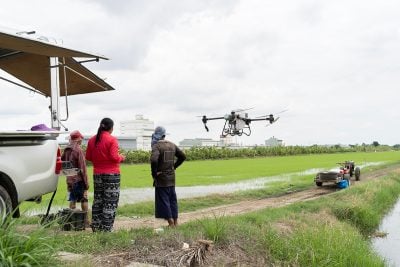In 2021, Egyptians Nour Altaher and Omar Mansour recognised a gap in Africa’s data analytics market and founded Intella. Their startup aimed to address the underrepresentation of Arabic in speech-to-text technologies. By leveraging artificial intelligence, machine learning, and big data sets, Intella set out to process the nuances of Arabic dialects, offering cloud-based solutions to transform contact centre voice recordings into useful business analytics.
Intella’s journey has mirrored the quickening evolution of Africa’s data analytics industry. Beginning with a $1m raise in 2022, the startup significantly advanced its growth trajectory by securing $3.4m in a funding round in late 2023, led by HALA Ventures and Wa’ed Ventures, part of Saudi oil giant Aramco. This funding round is not just a success for Intella but also a marker of the increasing momentum in Africa’s data analytics sector, highlighted by record investment this year, and a spike in professional course enrolments across the continent.
“We realised that the majority chunk of data lies within spoken words and not within actual tangible data points. So, this is when we decided to actually tap into speech tech in order for us to be able to curate datasets to gather data and to be able to analyse it for the Arabic language,” says Altaher.
“The main motivation is that if we don’t build data sets for our language, no one is going to do that for us. Arabic has always been left behind, which is something that we take to heart at Intella and it is our vision to bridge the gap between global AI advancements, and underdog languages starting with Arabic,” she added.
Intella has significantly expanded its scope in audio analytics, moving beyond traditional call transcription to encompass features like summarisation, sentiment analysis, topic extraction, and call scoring. Their use of Arabic dialects is deepening, with Intella Voice achieving a 95.7% accuracy rate across 25 dialects, Altaher said. This accuracy persists even in complex scenarios where dialects such as Najdi, Hejazi, Gulf, and Faifi are mixed within a single conversation.
“I always say people do two things. They eat a lot, and they talk a lot, but with all of this voice and talking if you cannot capture it and turn it into text you cannot analyse it. So, there is no data analysis for voice only. The first step is you turn this voice into text, and then you can mine it for valuable insights,” says Altaher, who led the firm’s move from Africa to the kingdom this year, as Saudi Arabia becomes a magnet for tech companies across the region.
The company offers a range of products tailored to various sectors. Intella Contact Centre Intelligence serves call centres with transcription and analysis tools, while Intella Surveys provides real-time insights for businesses. The broad application of their technology extends to government bodies, media agencies, and educational institutions, reflecting the versatility and utility of their AI solutions.
With a significant Arabic-speaking population in Africa of over 150m, and the influence of Arabic in the Swahili language, Intella is strategically expanding its reach across the continent.
“Our expertise in Arabic offers a unique edge in other languages, such as Swahili, which incorporates about 30% Arabic vocabulary. This synergy, fortified by our extensive Arabic datasets, enables us to expand our services effectively to other languages,” says Altaher.
Related articles
- AI tools open up a world of African languages
- Can AI address Africa’s agricultural trade deficit?
- AI will benefit Africa more than any other continent, says Smart Africa’s Lacina Koné
SMEs muscle in
In the rapidly evolving data analytics landscape of Africa, several SME firms are emerging, after years where only the big players had the means and money to utilise the ever-growing amount of data being created on the continent, says Bayo Adekanmbi, founder of Data Science Nigeria (DSN) – a data science/advanced analytics educator.
Mauritius’s Kuunda, a FinTech incubator, has raised $2.25m in seed funding since 2018, reflecting a keen investor interest in nurturing financial technologies for emerging markets. In Nigeria, Estate Intel, focusing on real estate and construction data, has attracted $610,000 in funding, carving out a niche in sector-specific analytics. Also from Nigeria, Voyance, with its $520,000 in funding, is leveraging data to solve pressing business issues. Meanwhile, in South Africa, 3DIMO’s innovative approach to livestock health management through data analytics, backed by a $25,000 investment, showcases the sector’s versatility.
Yet challenges remain, and SMEs need to be creative in the way they access data that will be useful to business on the continent.
“Social media mining, for instance, offers SMEs a cost-effective way to understand market dynamics without the need for extensive surveys,” says Adekanmbi.
“Customer reviews and online discussions reveal what works, what doesn’t, and where the opportunities for improvement or differentiation lie. Moreover, analytics can guide SMEs in market sizing and identifying new opportunities. By understanding customer needs, businesses can pinpoint where these needs are most acute – whether among specific age groups or geographic locations. This insight is crucial for effective market penetration and avoiding misguided efforts, he adds.
In the competitive Kenyan food processing industry, local data firm Bridge Analytics is spearheading an initiative to democratise data analytics among SMEs.
A local business specialising in popular products like tomato sauce faced a significant challenge in identifying and capitalising on sales opportunities in a tightly contested supermarket space. With limited shelf presence and the need to compete against well-established local and international brands, this processor needed to optimise its sales strategy across numerous retail outlets.
“We developed a series of detailed reports for the processor, focusing on performance metrics across five major retail chains, each with an extensive network of branches,” says Andrew Kenana, founder of Bridge Analytics.
“These reports were more than mere data compilations; they were tools to understand and predict consumer behaviour at a granular level – with the creation of a churn model. This model provided the processor with insights into how each product was performing in every outlet. By analysing the last ten transactions of each branch, the model could flag changes in buying patterns — for instance, if a branch that usually restocked every 15 days was now taking 20, and what impact this had on sales. Such insights were crucial for the food processor to adapt its strategies, ensuring better product placement and sales consistency in a highly dynamic market,” he adds.
Bridge Analytics is working with ten companies who are using its data analysis, who have found the sweet spot between paying for quality data and seeing their margins increase.
Sub-Saharan Africa is also leading the global surge in professional course enrolments, as evidenced by the 2023 Global Skills Report by US course provider Coursera. With an impressive growth rate surpassing those of Asia Pacific and North America, the region showcases robust participation in digital learning.
Nigeria records a remarkable 142,000 learners, contributing to the region’s total of 4.9 million participants on Coursera with a median age of 34. This enrolment includes a significant 35% female demographic and a majority who rely on mobile phones for their studies, reflecting the evolving digital landscape of the continent.
Mind the brain drain
However, despite this enthusiasm for digital education, Africa faces a critical challenge – a brain drain in its tech sector. The Nigerian phenomenon of ‘Japa’ – young professionals migrating abroad – exemplifies this trend.
In 2022 alone, about 500 Nigerian software engineers relocated, predominantly to Canada and European countries, drawn by higher wages.
In response, initiatives like Data Science Nigeria (DSN) are stepping up to position Nigeria as a prominent player in the global data science outsourcing market. DSN’s focus on enhancing the big data and machine learning ecosystem aims to secure a substantial portion of this growing sector. Through industry-centric events and bootcamps, DSN is not only emphasising the transformative potential of data but is also striving to pivot Nigeria’s economy from oil reliance to a data-driven model.
This aligns with the global trajectory where data science is increasingly recognised as a critical, in-demand profession, highlighting the importance of nurturing and retaining such talent within the continent.
“With only a few of us remaining to build and enhance local skills, our strategy hinges on increasing the talent pipeline. This is where our focus on early and radical training programs comes into play. The goal is to train extensively – say, 10,000 individuals – with the hope of retaining at least 1,000 within the country,” says Adekanmbi.
Want to continue reading? Subscribe today.
You've read all your free articles for this month! Subscribe now to enjoy full access to our content.
Digital Monthly
£8.00 / month
Receive full unlimited access to our articles, opinions, podcasts and more.
Digital Yearly
£70.00 / year
Our best value offer - save £26 and gain access to all of our digital content for an entire year!

 Sign in with Google
Sign in with Google 



